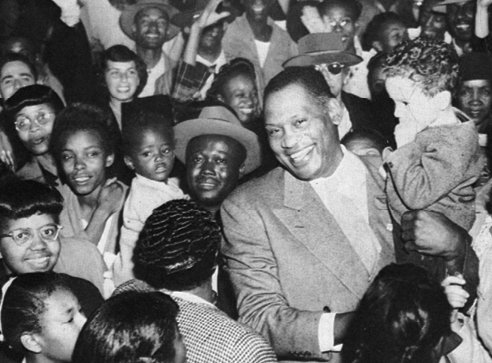
By LaVonna Varnado-Brown
PAUL ROBESON was one of the most outstanding examples of the artist as revolutionary. He was beloved by revolutionaries and ordinary working people around the world for his public and vociferous support of the Russian revolution, the USSR, and the revolutionary struggle for socialism. For his stance he was hated by the US capitalist ruling class.
Robeson was an all American Athlete in college, a professional football player, concert and opera singer, film star and stage actor, writer, linguist (he sang in 25 languages), scholar, orator, lawyer, and activist in the civil rights, labor, and peace movements. He attended Rutgers University and graduated from Columbia University. In the early 1930s Roberson leaned on his intrinsic gift of a powerful baritone and began working with composers and directors and became so popular that he was booked for international tours. In the 1930s and 1940s, Robeson was one of the most well-known American artists with comrades around the world.
The bedrock of the revolutionary spirit is integrity. The planks which build up the framework are the people in struggle. It’s the comrades and associates building trusting relationships through the struggle that actualize revolution. The roof is our ancestors, those who have transcended the physical struggle to leave legacies and stories for us to steel our struggle today. One freedom fighter whose name resonates far and distant yet still rings clear is Paul Robeson.
Robeson’s father was born into chattel slavery and purchased his freedom. His mom died in a kitchen fire. He describes a childhood that was loving, nurturing, and amicably stern. Despite the world his father was born into, Robeson envisioned a world in which he could be free. He worked and created that space for his four children. Robeson recalls in his biography Here I Stand watching how other people reacted to his father’s presence and knowing early that equality may have denied him, but he knew he was not inferior.
In 1929, he was intrigued upon encountering Welsh miners while singing in London. The spirit in the songs of the miners touched his soul, and he stopped to know their story. So he sat and sang to them and heard their stories. From then on everywhere he went he spoke up for workers.
Paul Robeson is special because he was truly an internationalist. He had compassion for all people engaged in the freedom struggle against the imperialist system. Not only people of African descent; but working people of all nationalities.
The best example of his commitment to the struggle was Robeson’s refusal to testify before the anti-communist witch-hunt McCarthy hearings in Congress. While other artists caved in, he stood firm in his beliefs. Even at the sacrifice of his career he maintained his principles. Both he and his family received death threats and were prohibited from traveling, yet he remained active and spoke his truth. In Here I Stand he states, “…I have publicly expressed my beliefs, … my deep convictions that for all mankind a socialist society which is economically, socially, culturally, and ethically superior to a system based upon production for private profit.”
Paul Robeson’s name deserves to be lifted as the hero he was. Present-day Marxist-Leninist organizers should look to his life as an example of allowing one’s convictions to call to them action. Every artist, scientist, teacher, server, hostess, mother has within them convictions—burning feelings that this world ain’t right. Let us not sit in solemn silence. Let us rise. Educate ourselves. Agitate our fellow workers. Then organize in the streets. Meet us at the barricade!
